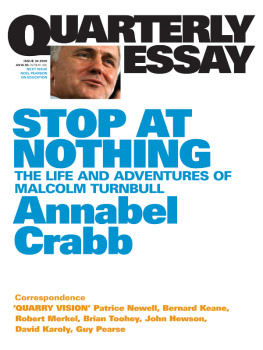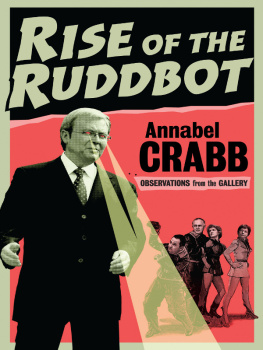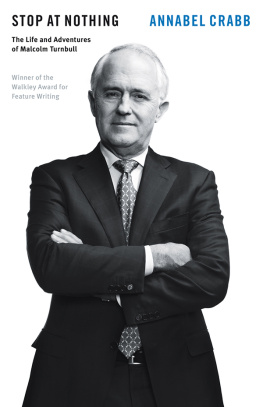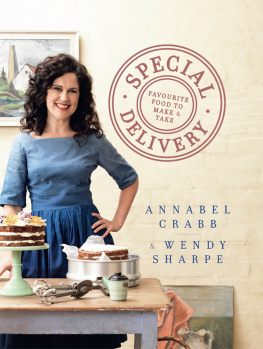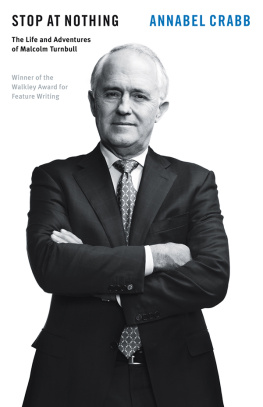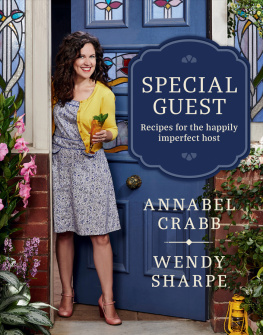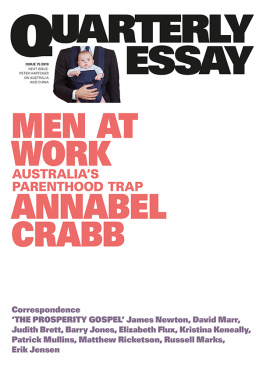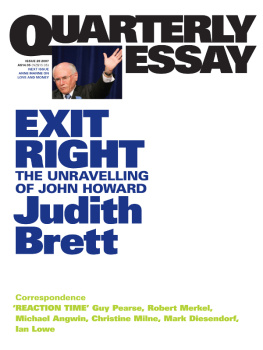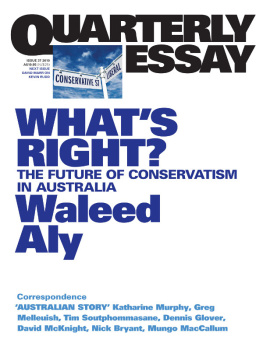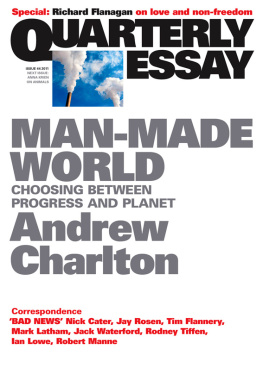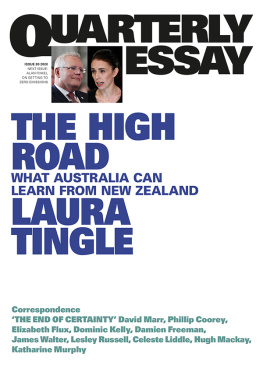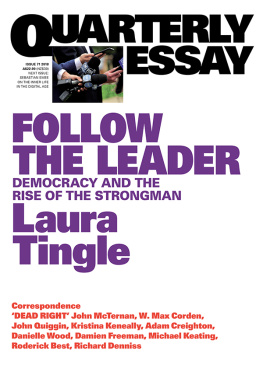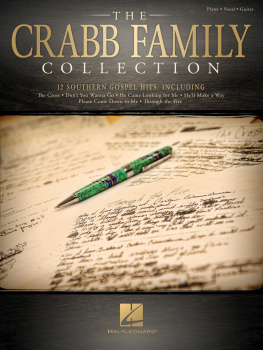Annabel Crabb - Quarterly Essay 34 Stop at Nothing
Here you can read online Annabel Crabb - Quarterly Essay 34 Stop at Nothing full text of the book (entire story) in english for free. Download pdf and epub, get meaning, cover and reviews about this ebook. year: 2009, publisher: Black Inc., genre: Detective and thriller. Description of the work, (preface) as well as reviews are available. Best literature library LitArk.com created for fans of good reading and offers a wide selection of genres:
Romance novel
Science fiction
Adventure
Detective
Science
History
Home and family
Prose
Art
Politics
Computer
Non-fiction
Religion
Business
Children
Humor
Choose a favorite category and find really read worthwhile books. Enjoy immersion in the world of imagination, feel the emotions of the characters or learn something new for yourself, make an fascinating discovery.
- Book:Quarterly Essay 34 Stop at Nothing
- Author:
- Publisher:Black Inc.
- Genre:
- Year:2009
- Rating:5 / 5
- Favourites:Add to favourites
- Your mark:
- 100
- 1
- 2
- 3
- 4
- 5
Quarterly Essay 34 Stop at Nothing: summary, description and annotation
We offer to read an annotation, description, summary or preface (depends on what the author of the book "Quarterly Essay 34 Stop at Nothing" wrote himself). If you haven't found the necessary information about the book — write in the comments, we will try to find it.
Quarterly Essay 34 Stop at Nothing — read online for free the complete book (whole text) full work
Below is the text of the book, divided by pages. System saving the place of the last page read, allows you to conveniently read the book "Quarterly Essay 34 Stop at Nothing" online for free, without having to search again every time where you left off. Put a bookmark, and you can go to the page where you finished reading at any time.
Font size:
Interval:
Bookmark:
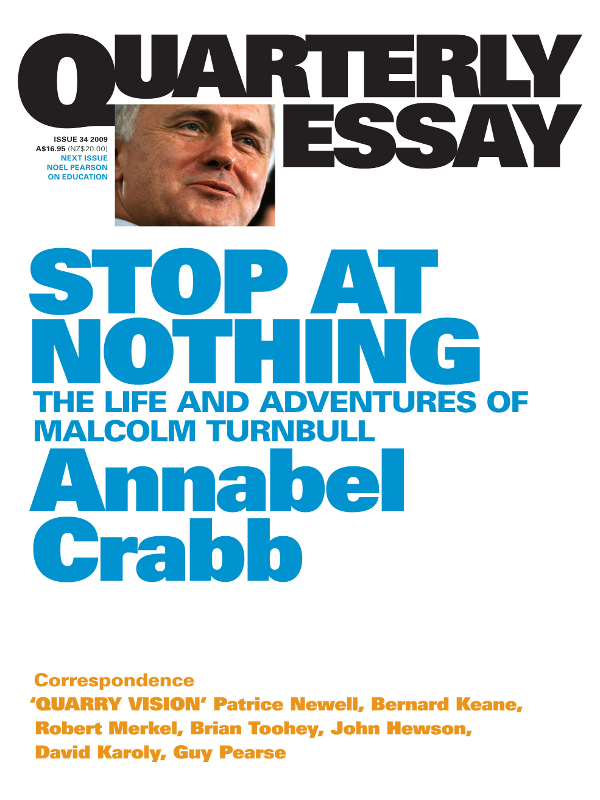
Quarterly Essay
Quarterly Essay is published four times a year by Black Inc., an imprint of Schwartz Media Pty Ltd.
Publisher: Morry Schwartz.
ISBN 978-1-86395-431-0 ISSN 1832-0953
ALL RIGHTS RESERVED.
No part of this publication may be reproduced, stored in a retrieval system, or transmitted in any form by any means electronic, mechanical, photocopying, recording or otherwise without the prior consent of the publishers.
Essay & correspondence retained by the authors.
Subscriptions 1 year (4 issues): $49 within Australia incl. GST. Outside Australia $79.
2 years (8 issues): $95 within Australia incl. GST. Outside Australia $155.
Payment may be made by Mastercard, Visa or Bankcard, or by cheque made out to Schwartz Media. Payment includes postage and handling.
To subscribe, fill out and post the subscription card, or subscribe online at:
www.quarterlyessay.com
Correspondence and subscriptions should be addressed to the Editor at:
Black Inc. Level 5, 289 Flinders Lane
Melbourne VIC 3000 Australia
Phone: 61 3 9654 2000 / Fax: 61 3 9654 2290
Email:
quarterlyessay@blackincbooks.com (editorial)
subscribe@blackincbooks.com (subscriptions)
Editor: Chris Feik / Management: Sophy Williams, Caitlin Yates. Publicity: Elisabeth Young / Design: Guy Mirabella. Production Co-ordinator: Adam Shaw
Printed in Australia by McPhersons Printing Group.
CONTENTS
STOP AT NOTHING
The Life and Adventures of Malcolm Turnbull
Annabel Crabb
Patrice Newell, Bernard Keane, Robert Merkel, Brian Toohey,John Hewson, David Karoly, Guy Pearse
Contributors
STOP AT
NOTHING
The Life and Adventures of
Malcolm Turnbull
Annabel Crabb
Malcolm Turnbull is standing in the business aisle of a Qantas flight, fiddling with his BlackBerry. Weve just touched down in Sydney and are halfway through a discussion about military butlers, or batmen, on which topic his assistant Nick Berry a former army man has offered certain insights. Within seconds of the seatbelt light blinking off, Turnbull is out of his seat and Googling. He is trying to look up the etymology of the word batman, but his gadget wont work fast enough for him to find the answer before the queue of passengers behind him polite, for the time being builds into one of those quietly angry mobs you see from time to time on freshly landed planes.
It must be French, Turnbull mutters, to no-one in particular.
Then he snaps back into the real world and notices a gentleman hovering tentatively at his right armpit. Accurately gauging his concern, Turnbull retrieves a suitcase from the overhead locker for the man and throws in a dazzling smile. The man looks utterly delighted.
Turnbull tends to switch on and off. You can be in an absorbing exchange with him and then notice that he has gone quiet, his conversational contribution reduced to the occasional sonorous Mmmmm. Then you realise that hes twiddling away at the BlackBerry, or hes jammed the Bluetooth earpiece in his ear and is vetting phone messages.
Turnbulls fascination for gadgetry is boundless. He was an early enthusiast for information technology, and made a bundle when he and his buddy Trevor Kennedy sold their stake in OzEmail a decade ago. He is addicted to his BlackBerry, emails at all hours and is signed up to Facebook, Twitter and MySpace. He is constantly rifling through and making additions to his own electronic diary, to the consternation of his staff.
Turnbull can switch with deceptive ease between real communication and electronic communication. In the flight lounge in Hobart several hours earlier, I had plumped down in a seat next to him and asked if he would like a cup of tea I was fetching one for myself.
Knitting his eyebrows and staring straight ahead, he replied sternly: Well, I cant see how that could possibly work. Scanning his face for clues (perhaps he was a coffee man?) I noticed the flash of the busy Bluetooth device clipped to his ear, realised my error and stole away.
Real-life conversations with Malcolm Turnbull, however, are worth sticking around for. In Canberra, you are considered well-read if youve consumed everything on offer about Australian politics. If youve read about American and British politics as well, you are thought something of a don; knowledge of European politics implies the definite possibility that you might fancy yourself. Many, like John Howard, are voracious readers but restrict their consumption largely to their own professional field, with occasional excursions to the history shelves. Howards ideal novel, one always suspected, would concern the policy adventures of a deeply principled, perhaps slightly built prime minister with a thing for cricket and an eagle-eyed wife.
Turnbull, however, has a taste for poetry and literature, and a tendency to veer away from politics at any and every conversational opportunity. When he called journalists together in December last year for Christmas drinks, we gathered in the Opposition party room under the framed photographs of his predecessors. Under such photos, most Christmases, do Opposition leaders deliver up a banal series of festive remarks along the lines that Christmas is the time for a brief ceasefire between the Opposition and the fourth estate, haw-haw.
Turnbull, who had by then been the leader of the Liberal Party for six weeks, eyed the photos briefly (tufty-browed Howard, soulful Brendan Nelson) and instead told a raucous story about Kerry Packer.
This one involved Packer hastily sticking a portrait of his father, Sir Frank, above his desk as a prop for an utterly fraudulent display of filial tears designed to extract more cash from Alan Bond for Channel Nine.
Once the Bond team was in his office and a figure mentioned for the sale, Packer commenced to gaze moistly at his fathers portrait.
When I look at my father and wonder what hed think of my selling Nine well, I dont think hed want me to do it, sniffled the mogul. When the Bond team was gone having agreed to a fabulous price Packer spun to face Turnbull and winked.
Now, son howd that go? he asked.
Turnbull confided to us that, deep down, he remained a journalist at heart. It was his first job. And he offered one piece of advice to the press gallery: Dont be dull.
Turnbull himself has wasted very little of his life being dull, which is why conversations with him tend to be interesting. His life before politics has done several things for him. First, its made him very rich. Second, its made him some enemies. Third, its given him an inexhaustible supply of dinner-party anecdotes.
Malcolm is a colossal name-dropper, says one former cabinet colleague. He wont just offer an opinion on economic policy hell always preface it with something like As I was saying to Tim Geithner the other day
Name-dropper, yes. But to be fair, he has excellent material. Six Degrees of Malcolm Turnbull, in which any famous person in the world can be connected to Turnbull within six steps, would be a feasible party game. John F. Kennedy? Okay: from Kennedy we make an easy leap to his showbiz friend Frank Sinatra, and thence to Sinatras fellow rat-packer Humphrey Bogart. Who starred in Casablanca with Ingrid Bergman, who was leading lady in Gaslight, which was also the screen debut in 1944 for a very young Angela Lansbury, whose cousin Coral ten years later gave birth to her first and only child, Malcolm Bligh Turnbull.
Mick Jagger? Thats even easier. Jagger is a one-time guest of Brixton Prison, having been briefly incarcerated there in 1967 after police busted him with a modest quantity of illicit mood-enhancement pills. Another former Brixton prisoner is Malcolm Turnbulls great-great-uncle, the former British Labour leader George Lansbury. Lansbury, as Labour mayor of Poplar in 1921, did six weeks in Brixton as a penalty for redistributing council tax income to the needy rather than funnelling it to London; this heroic gesture produced the term Poplarism and transformed Lansbury into a folk hero.
Next pageFont size:
Interval:
Bookmark:
Similar books «Quarterly Essay 34 Stop at Nothing»
Look at similar books to Quarterly Essay 34 Stop at Nothing. We have selected literature similar in name and meaning in the hope of providing readers with more options to find new, interesting, not yet read works.
Discussion, reviews of the book Quarterly Essay 34 Stop at Nothing and just readers' own opinions. Leave your comments, write what you think about the work, its meaning or the main characters. Specify what exactly you liked and what you didn't like, and why you think so.

